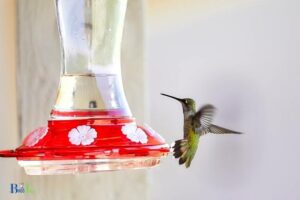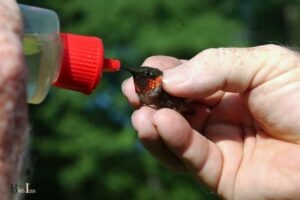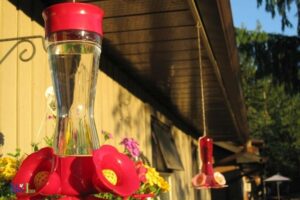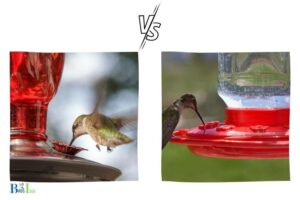Can Hummingbirds Get Sick from Feeders: Yes!
Yes, hummingbirds can get sick from feeders if they are not properly maintained and cleaned.
Hummingbird feeders can harbor harmful bacteria, mold, and other contaminants that can lead to infections or illnesses in hummingbirds.
It is essential to clean and maintain feeders regularly to ensure that the sugar water is fresh and free from any harmful agents.
To prevent hummingbirds from getting sick, it’s crucial to clean and sanitize feeders every few days or at least once a week.
Use a 10% bleach solution to kill harmful bacteria and mold, and thoroughly rinse the feeder with clean water before refilling with fresh sugar water. Additionally, change the sugar water regularly, ideally every 2-3 days in hot weather or if it appears cloudy.
By following these guidelines, you can ensure a safe and healthy feeding environment for hummingbirds.
5 Potential Illness Can Hummingbirds Get Sick from Feeders:
| Potential Illness | Causes | Symptoms | Prevention Methods |
| Bacterial Infection | Contaminated feeders, poor feeder maintenance | Lethargy, difficulty flying, swollen eyes, difficulty breathing | Clean feeders regularly, replace nectar every 2-3 days, use a 4:1 water to sugar ratio |
| Fungal Infection | Contaminated feeders, moldy nectar | Lethargy, difficulty breathing, discolored or scaly skin | Clean feeders regularly, replace nectar every 2-3 days, avoid using honey or artificial sweeteners |
| Parasites | Contaminated feeders, contact with infected birds | Weight loss, difficulty breathing, feather loss | Clean feeders regularly, monitor for signs of infested birds, provide clean water sources for bathing |
| Avian Pox | Contact with infected birds or surfaces | Lesions on skin and around the beak, difficulty breathing, swollen eyes | Clean feeders regularly, disinfect feeders if infected birds are present, remove any standing water |
| Salmonellosis | Contaminated feeders, contact with infected birds | Lethargy, diarrhea, ruffled feathers, swollen eyes | Clean feeders regularly, disinfect feeders if infected birds are present, remove any standing water |
Key Takeaway
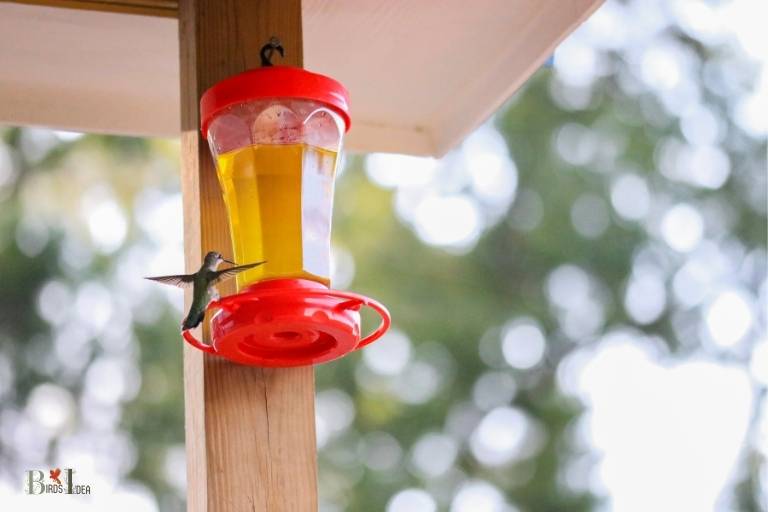
Five Facts About: Can Hummingbirds Get Sick from Feeders
Understanding The Risks Of Feeders For Hummingbirds
Hummingbirds are fascinating creatures, and many people enjoy observing them at feeders. However, there are risks associated with using feeders that people need to be aware of. In this section, we will discuss the importance of understanding these risks.
The Link Between Feeders And Disease Transmission In Hummingbirds
Using feeders can increase the risk of disease transmission among hummingbirds.
Here are some of the reasons why:
- Sharing feeders can result in contact between multiple birds, increasing the likelihood of disease transmission.
- Feeders can also become contaminated with bacteria, fungi, or parasites, which can then infect birds that use the feeder.
- Consistently providing a reliable source of food at a single location can increase the risk of overcrowding, which can also lead to the spread of disease.
The Danger Of Feeders Being Contaminated With Bacteria, Fungi, Or Parasites
There are several ways in which feeders can become contaminated with bacteria, fungi, or parasites.
Here are some potential sources of contamination:
- Dirty feeders: Feeders that are not cleaned properly can harbor bacteria and fungi that can make birds sick.
- Infected birds: Birds that are already infected with bacteria, fungi, or parasites can spread the infection to other birds that use the feeder.
- Contaminated nectar: Using nectar that is contaminated with bacteria or fungi can lead to the spread of disease among hummingbirds.
The Significance Of The Vulnerability Of Hummingbirds To Infections And Illnesses
Hummingbirds are vulnerable to infections and illnesses, and taking steps to reduce the risk of disease transmission at feeders is crucial.
Here are some reasons why hummingbirds are susceptible to disease:
- Hummingbirds have a fast metabolism, which means they require a lot of food to maintain their high energy levels. This can lead to crowded feeding conditions, which can increase the risk of disease transmission.
- Hummingbirds have a heightened sensitivity to toxins, which means that even small amounts of contaminants can be harmful to them.
- Hummingbirds also have a high body temperature, which can create optimal conditions for bacterial and fungal growth.
While feeders can be a great way to observe and enjoy hummingbirds, it is important to understand the risks involved with their use. By taking steps to reduce the risk of disease transmission, you can help protect these amazing birds.
Common Diseases Hummingbirds Contract Through Feeders
Overview Of The Most Prevalent Diseases Hummingbirds Are Exposed To
Hummingbirds are prone to various diseases that can harm their health and even lead to death.
Some of the most common diseases that hummingbirds contract through feeders are:
- Avian pox
- Salmonella
- Aspergillosis
- Candidiasis
- Mycoplasmosis
Although it’s difficult to prevent diseases in wild hummingbirds, keeping feeders clean and hygienic can help reduce the risk of transmission.
Explanation Of How Diseases Are Transmitted Through Feeders
Hummingbirds can contract diseases through dirty or contaminated feeders, which can be caused by several reasons.
These include:
- Sharing feeders among multiple hummingbirds
- Feeding them with a concentrated sugar solution that can foster bacterial growth
- Not cleaning the feeders frequently enough
- Using contaminated water in the solution
- Letting the solution spoil in the heat
When a sick hummingbird feeds on a feeder, it may leave behind bacteria or viruses which can infect other birds that use the same feeder.
Symptoms Of The Diseases That Hummingbirds Contract Through Feeders
Symptoms of the diseases that hummingbirds contract through feeders can vary depending on the type of disease.
Generally, the common symptoms are:
- Lethargy and weakness
- Weight loss
- Diarrhea
- Difficulty breathing
- Skin lesions or blisters
If you notice any of these symptoms, you should immediately remove the feeder and contact a licensed wildlife rehabilitator.
Prevention Tips To Decrease The Risk Of Diseases In Hummingbirds
There are various ways to decrease the risk of diseases in hummingbirds through feeders.
Here are some prevention tips:
- Clean feeders at least once per week with a weak bleach solution (1 part bleach to 9 parts water)
- Rinse the feeder thoroughly with clean water and dry before refilling
- Change the solution every 3-5 days even if it’s not finished
- Use a feeder brush to scrub tough-to-reach areas
By implementing these prevention tips, you can help keep your backyard hummingbirds healthy and happy.
Factors That Increase The Risk Of Sickness In Hummingbirds
Detailed Information About The Factors That Increase The Likelihood Of Hummingbirds Getting Sick From Feeders
The feeders that you put out for hummingbirds might not always be safe for them.
Here are some factors that increase the likelihood of hummingbirds getting sick:
- Dirty feeders: When you don’t clean your feeders regularly, they can become a breeding ground for bacteria and fungi that can harm hummingbirds.
- Old nectar: Hummingbirds need fresh nectar to stay healthy. If the nectar in your feeder is more than 3-5 days old, it won’t be safe for them to drink.
- Artificial dyes: Nectar that contains artificial dyes can be harmful to hummingbirds.
- Insects: Bees, wasps, and ants can contaminate the nectar and make it unsafe for hummingbirds to consume.
- Mouldy seed or plant debris: Mouldy seed or plant debris around the feeder can cause fungal growth that can harm hummingbirds.
The Importance Of Proper Feeder Hygiene
Maintaining proper hygiene is crucial when it comes to hummingbird feeders.
Here are some tips to keep your feeder clean and safe:
- Clean your feeder at least once a week: Clean your feeder with hot water and soap, scrubbing all the parts to remove any dirt or mould. Rinse it thoroughly and make sure it’s completely dry before adding fresh nectar.
- Use natural cleaning agents: Use vinegar or lemon juice instead of bleach or dish soap to clean your feeder.
- Check the nectar regularly: Remove any unconsumed nectar after 3-5 days, and clean the feeder before filling it up with fresh nectar.
Feeder Placement And Its Impact On Hummingbird Health
The placement of your hummingbird feeder can also affect their health.
Here are some things to consider:
- Keep the feeder in the shade: Direct sunlight can cause the nectar to spoil quickly and can also overheat the hummingbirds.
- Keep it away from windows: Hummingbirds can sometimes fly into windows, causing injury or death. Place your feeder at least 3 feet away from windows or use window stickers to prevent accidents.
- Keep it out of reach of predators: Place your feeder at a height where cats, squirrels, and other predators can’t reach it.
The Potential Dangers Of Overcrowding Hummingbird Feeders
Overcrowding is another issue that can affect the health of hummingbirds.
Here are some potential dangers of overcrowded feeders:
- Competition for food: Hummingbirds are territorial creatures, and if there are too many of them at a feeder, they might become aggressive and attack each other.
- Spread of disease: Overcrowded feeders can spread diseases quickly, and sick birds can infect healthy ones.
- Stress: Too many hummingbirds at a feeder can cause stress, which can weaken their immune system and make them more susceptible to diseases.
Overall, taking care of hummingbirds doesn’t just mean putting out a feeder. Proper hygiene, placement, and spacing are essential to ensure these tiny birds stay healthy and happy.
Effective Strategies For Hummingbird Feeder Management
Overview Of Effective Management Strategies For Hummingbird Feeders
Hummingbirds are fascinating creatures and providing them with a feeder in your garden can be both rewarding and enjoyable. However, with this privilege comes the responsibility of maintaining the feeder properly.
Here are some effective strategies for managing hummingbird feeders:
Proper Maintenance And Cleaning Of Hummingbird Feeders
Hummingbird feeders require regular maintenance to remain clean and effective.
Here are some tips to follow:
- Clean the feeder with hot water and soap on a regular basis, at least every few days.
- It is important to periodically use a solution of one-part white vinegar to four parts water to clean the feeder and kill any bacteria or mold growth on it.
- Rinse the feeder thoroughly with hot water, making sure there is no soap residue.
- Refill the feeder with fresh nectar before putting it back up.
Choosing The Right Location For Hummingbird Feeders
Location is a critical factor in attracting hummingbirds to your garden.
Here are some recommendations:
- Place your feeder near flowers that hummingbirds prefer as this will make it easier for them to find.
- Make sure that the feeder is in a shaded area and not in direct sunlight as this can cause the nectar to spoil quickly.
- Keep the feeder away from windows to minimize the risk of hummingbirds colliding with them.
Identifying And Addressing Signs Of Illness In Hummingbirds
It is important to keep an eye out for signs of illness in hummingbirds that visit your feeder.
Here are some signs of illness to look for:
- Lethargy or lack of movement.
- Discharge from the beak or eyes.
- A swollen or fluffed up appearance.
- Lack of appetite or interest in the feeder.
- Abnormal wing or tail position.
If you spot any of these signs, it is essential to take quick action to address the issue:
- Remove the feeder to prevent the spread of disease.
- Clean the feeder thoroughly and replace the nectar.
- Contact a local wildlife rescue or veterinarian for further assistance.
Keeping hummingbirds healthy and happy requires a little bit of effort on your part, but the rewards are well worth it.
By following these effective strategies for managing hummingbird feeders, you can ensure that you are providing the best possible environment for these amazing birds to thrive.
Long-Term Impacts Of Feeders On Hummingbird Populations
The Long-Term Implications Of Feeders On Hummingbird Population Dynamics
Hummingbirds are fascinating tiny creatures that have been thriving for ages without human intervention. However, the growing popularity of providing sugar water through feeders has raised questions on the long-term impacts on hummingbird populations.
Here are some key points to consider:
- Feeder dependency: Hummingbirds can quickly become reliant on feeders as a food source, leading to potential negative impacts on their natural foraging behaviors and distribution.
- Competition: Overcrowding and competition at feeders can alter hummingbird feeding behaviors and negatively impact their breeding success.
- Disease transmission: Hummingbird feeders can be hotspots for disease transmission between individuals, leading to the spread of illness throughout the population.
- Genetic impact: The use of feeders can lead to changes in hummingbird genetics as some adapt better to urban and suburban environments where feeders are prevalent.
The Benefits Of Feeding Hummingbirds Versus The Potential Harm To Their Natural Foraging Behaviors
Providing hummingbirds with a food source through feeders can be beneficial in several ways, but it is essential to consider the potential harm to their natural foraging behaviors.
Here are some key points to note:
- Feeding frequency: Hummingbirds with access to feeders can consume more nectar than their wild counterparts, leading to better health and breeding success.
- Feeder placement: Proper feeder placement can help maintain natural feeding behaviors by reducing competition and overcrowding.
- Foraging abilities: Hummingbird access to feeders can lead to decreased foraging abilities, which can negatively impact their survival in the long term.
Comprehensive Discussion On The Potential Impacts Of Feeders On Hummingbird Evolution And Ecology
Hummingbirds have evolved and thrived for centuries without the need for human intervention. The use of feeders can potentially interrupt this delicate balance and lead to significant ecological impacts.
Here are some key points to consider:
- Limited geographic range: Hummingbirds that become feeder-dependent risk losing significant genetic diversity and may struggle to survive in different environments.
- Food resource competition: Access to feeders can lead to increased competition for nectar, leading to potential declines in native plant pollination.
- Predation: Feeder-dependent hummingbirds may be more susceptible to predatory birds, which can negatively impact the population.
Strategies To Ensure Hummingbird Conservation Amid The Rising Popularity Of Feeders
Hummingbird feeders can provide valuable benefits to these tiny creatures, but it is essential to prioritize species conservation.
Here are some strategies to consider:
- Use natural food sources: Consider planting native flowering plants to supplement or replace feeders and provide hummingbirds with a natural food source.
- Feeder hygiene: Implement a rigorous cleaning schedule to reduce disease transmission between feeder dispensers.
- Limit feeding frequency: Reducing feeder access frequency can minimize feeder-dependency and help maintain natural foraging behaviors.
- Education: Spread awareness among feeder users about the potential impacts of feeders on hummingbirds and encourage responsible feeder use.
By following these strategies, we can ensure that hummingbirds thrive while also enjoying the beauty of these amazing creatures.
FAQ For Can Hummingbirds Get Sick From Feeders
Can Hummingbirds Get Sick From Feeders?
How Often Should I Clean My Hummingbird Feeder?
How Do I Prevent Mold In My Hummingbird Feeder?
What Should I Do If I See Sick Hummingbirds At My Feeder?
Conclusion
Hummingbirds are amazing creatures that are fun to watch and enjoy, especially when they visit your backyard feeders.
Although it is rare, hummingbirds can get sick from feeders. It is important to keep your feeders clean and well-maintained to ensure the health of these beautiful birds.
If you notice any signs of illness or unusual behavior in your hummingbirds, it is essential to act quickly and remove the feeders until the issue is resolved. By being vigilant and following these simple steps, you can help protect your feathered friends and keep them healthy and happy.
Remember, a little care and attention can go a long way towards ensuring the wellbeing of these amazing creatures. So, take care of your hummingbird feeders, and continue to enjoy the beauty and joy they bring to your life.

